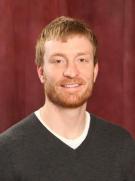Justin Wilmes

Education: B.A., Miami University of Ohio, Russian Language; B.S., Miami University of Ohio, Computer Science; M.A, Ohio State University, Slavic and East European Studies; Ph.D., Ohio State University, Slavic and East European Languages and Literatures.
Justin Wilmes is Assistant Professor of Russian Studies at East Carolina University.
When did you first develop an interest in Slavic, East European and Eurasian Studies?
Being of Irish-German descent and growing up in Ohio, I am often asked this. Russia always intrigued me — especially after reading works like Crime and Punishment and The Overcoat in school — but the interest really culminated when I was an undergraduate at Miami University of Ohio. I was studying computer science at the time and took a course in Russian language to fulfill a requirement. I found that I really loved the language. I had some very good professors there, including Irina Goncharenko and Ben Sutcliffe, who were able to bring the language and literature to life for me. The following summer I went to Velikii Novgorod on a 2-month study program and fell in love with it. The appeal of living in this sleepy provincial town — in a cramped apartment with my Russian host family, amid endless rows of bloc housing — is likely lost on many people, but this side of Russia has a certain magic for me (not to mention its fascinating history and rich artistic traditions). Ultimately I added a second major in Russian. After graduating and working for a year in the computer industry, I was awarded a Fulbright Fellowship and spent a year living and teaching in Novosibirsk. This year in Siberia convinced me to change careers and I entered the graduate program in Slavic studies at Ohio State University.
How have your interests changed since then?
I would say that, in addition to Russian language, my first real love in Slavic studies was the Russian literary canon. Most of my graduate coursework dealt with this tradition, and I thought and wrote a lot about these works and authors. Griboedov, Dostoevsky, Chekhov, Mayakovsky, Blok, Olesha… Over time my interest in cinema grew, and ultimately I wrote my dissertation on post-Soviet cinema. I am interested in cultural studies more broadly and like to think I straddle the line between literary and film studies. During my Ph.D. work I also picked up the Polish language and have lived for a number of summers in Krakow. This has led to a growing interest in Polish literature and cinema as well.
What is your current research/work project?
Since completing my Ph.D. in May, I’ve begun revising my dissertation for future publication, either as a book or a series of articles. The dissertation, titled “Projecting Social Concerns: Auteur Cinema in the Putin Era,” is a study of social concerns in post-milenial cinema: Russian national identity and constructions of history; interethnic relations and depictions of the Other; political discourse, including attitudes to democracy and authoritarianism, etc. It also attempts to give a portrait of the Putin-era generation of auteurs often called the “Russian New Wave” or “New Quiets,” including their aesthetic tendencies and social commentary. As Russian civil society has grown more constrained in recent years, auteur cinema — like theater and the visual arts — has taken on greater importance as a locus for negotiating these discursive issues.
In addition to this project, I have been working on a translation of a contemporary Polish author and I am completing revisions of an article analyzing the novel The Doll by the 19th-century Polish writer Bolesław Prus. First and foremost, I am preparing for my new position at East Carolina University and my courses there in the fall.
What do you value about your ASEEES membership?
I’ve found membership in ASEEES very valuable in my short time (three years) as a member. I always leave the ASEEES conference with new ideas, feeling reinvigorated and inspired to work on my own projects. I appreciate that ASEEES brings together so many diverse disciplines, and does not confine itself to languages and literatures. ASEEES has also been a good way to meet scholars in the field with similar interests. I have already seen these meetings lead to new friendships and to likely future collaboration.
Besides your professional work, what other interests and/or hobbies do you enjoy?
I have more hobbies than there is time for. I love sports: running, swimming, yoga, soccer, basketball. I enjoy hiking, camping, and the outdoors. Good literature and cinema, of course. Perhaps it is premature aging, but I’ve gotten very interested in cooking and gardening this year.
